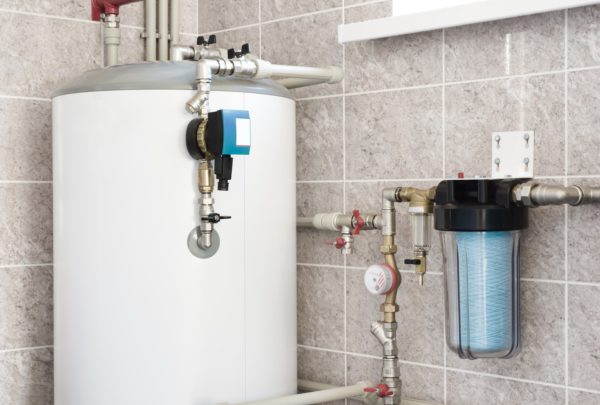Modern water heaters are impressively safe devices. Still, there are steps you should take to keep you, your family and your home even safer.
All Water Heaters
Schedule Annual Maintenance
Don’t take a break-fix approach to your water heater. Schedule maintenance on an annual basis. Basic care can make a big difference when it comes to safe operation. That care includes flushing the tank, testing the thermostat and valves and replacing the anode rod as needed.
Monitor for Recalls
While modern water heaters are very safe, there are exceptions due to manufacturing errors. You should check yearly if the manufacturer has recalled your water heater model. The U.S. Consumer Product Safety Commission website has a list of water heater recalls. You may need the last four digits of the model’s serial code, which you’ll find on the water heater label.
Keep Temperature at 120 Degrees Fahrenheit
Many water heater models have a default setting of 140 degrees Fahrenheit. The U.S. Department of Energy recommends 120 degrees. It’s the sweet spot between comfort and energy efficiency. It also ensures that no one in your home gets seriously burned.
Consider Anti-Scale Devices
Scalds account for 20% of all burns in the home. Children are much more sensitive to scalds than adults. If you have young children, consider anti-scald devices. You can purchase kitchen and plumbing fixtures with an anti-scald valve. That valve ensures a proper balance between hot and cold.
Test Temperature-Pressure Relief Valve Annually
All water heaters have a T&P valve. This valve is a safety feature that releases if temperature or pressure gets too high. If the valve isn’t functioning, the water heater could, in theory, explode. Each year, clean the T&P valve of debris, rust or other corrosion. Lift the valve up and down several times. You should hear gurgling, and water should be released into the drain tube. If it doesn’t release, shut the water heater off, and call a professional.
Avoid Combustibles
Keep all combustibles away from the water heater. This is particularly important with gas water heaters but relevant to electric water heaters. The size of the area matters as well. Water heaters in closets are much more prone to combusting materials than those if they are in open spaces.
Don’t Store Anything That Can’t Get Wet
All water heaters can leak. Water damage from a leaking water heater with a large tank can be substantial quickly. Never keep anything of value near the water heater.
Use the Lowest Possible Temperature Setting When on Vacation
When you go on vacation, put your water heater in vacation mode if applicable. Otherwise, turn the water heater thermostat to its lowest setting. Doing so will save you money. It also makes it much less likely that you’ll experience a leak or other issues with temperature and pressure while away.
Tank Water Heaters
Use Earthquake Straps
Straps are a common safety feature in areas prone to earthquakes. They’re easy to install to prevent a tank from falling over. It’s a relatively cheap and simple upgrade as well.
Inspect for Corrosion
During your annual inspection, your plumber will check the tank for corrosion. If you don’t schedule that appointment, you should check for yourself. Tank leaks are a common problem but generally avoidable. A tank will show signs that it may leak long before it does.
Tankless Water Heaters
Check the Overheat Cutoff Fuse
All tankless water heaters require electricity. That includes those that burn natural gas or heating oil. They can overheat too, which is why they have an overheat cutoff fuse. Each year, check the fuse to ensure that it’s functional. Replace it as needed.
Test the Air-Fuel Ratio Sensor
An AFR sensor is specific to on-demand water heaters that burn fuel. A water heater uses this sensor to ensure that it mixes air and fuel at the correct ratio. You need to have the sensor professionally tested each year. A bad sensor can lead to reduced energy efficiency and higher emissions.
Gas Water Heaters
Install an Automatic Gas Shutoff Valve
A water heater gas shutoff valve is a simple upgrade that you can have your plumber add to your system. It will automatically cut off the gas if it senses excessive flow. Seismic detection is an option as well. This valve helps to avoid most gas-related mishaps and can even result in a homeowner insurance premium reduction.
Ensure Proper Ventilation
Another reason to have your gas water heater inspected each year is to ensure proper ventilation. Your plumber will also check that there are no backdraft scenarios. This is where other ventilation can inadvertently draw in vented gases.
Regularly Check Carbon Monoxide Detectors
All gas appliances require one or more carbon monoxide detectors in the home. Test CO monitors at least once a month. Replace batteries as needed. Replace the units themselves at least every 10 years.
Do Not Insulate Near the Hood or Exhaust
You generally do not need to insulate a gas water heater outside of the water lines. If you want to add a blanket or other insulation, we recommend checking with a professional. If you do it yourself, take care not to insulate within 6 inches of the hood or exhaust. Doing so can interfere with proper ventilation.
Keep the Burner Clean
Have the burner professionally cleaned each year. A dirty burner is less efficient and will create more dangerous gases. It will also be more prone to starting a fire.
Raise Pilot Light to 18 Inches
If you have your gas water heater in the garage, there should be at least 18 inches of clearance. That is the area between the pilot light and the floor. This distance is to protect against the potential ignition of gasoline fumes.
Electric Water Heaters
Take Care With Insulation
If you have an electric tank water heater, insulation can save you money. It’s important to choose appropriate insulation materials and install them correctly to avoid a potential fire. We recommend hiring a professional to install your insulation materials.
Avoid High Temperatures With Insulation
If you insulate your electric water heater, never set the thermostat above 130 degrees Fahrenheit. Doing so can cause the wiring, the thermostat and other electrical components to overheat.
Don’t Overload the Electrical Circuit
An electric water heater draws significant power. It’s recommended that a water heater has a dedicated circuit. Code now requires this, so most modern homes are set up this way. If you have an older home that isn’t, remove all other appliances from that circuit. You may also want to have an electrician in to check the circuit and ensure that it’s dedicated to the water heater.
Water Heater Experts in Roseville
C & C Heating and Air Conditioning can help Roseville homeowners ensure their water heaters are as safe as possible. Our HVAC technicians also install and service thermostats, furnaces, air conditioners, heat pumps and ductless mini-splits. They clean ducts and install air purifiers, UV lights, dehumidifiers and humidifiers. Contact us today with any questions or to schedule an appointment.





